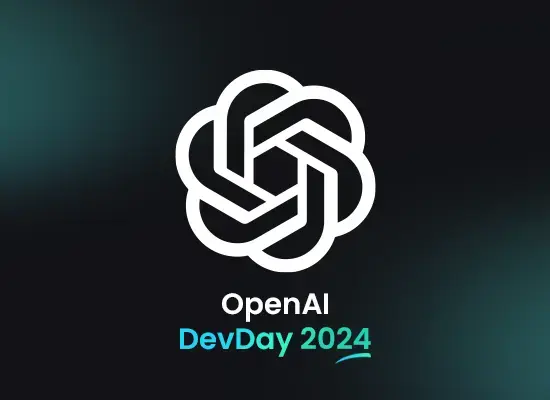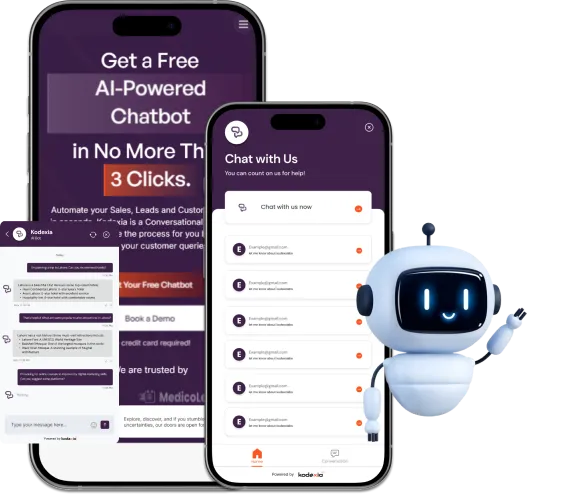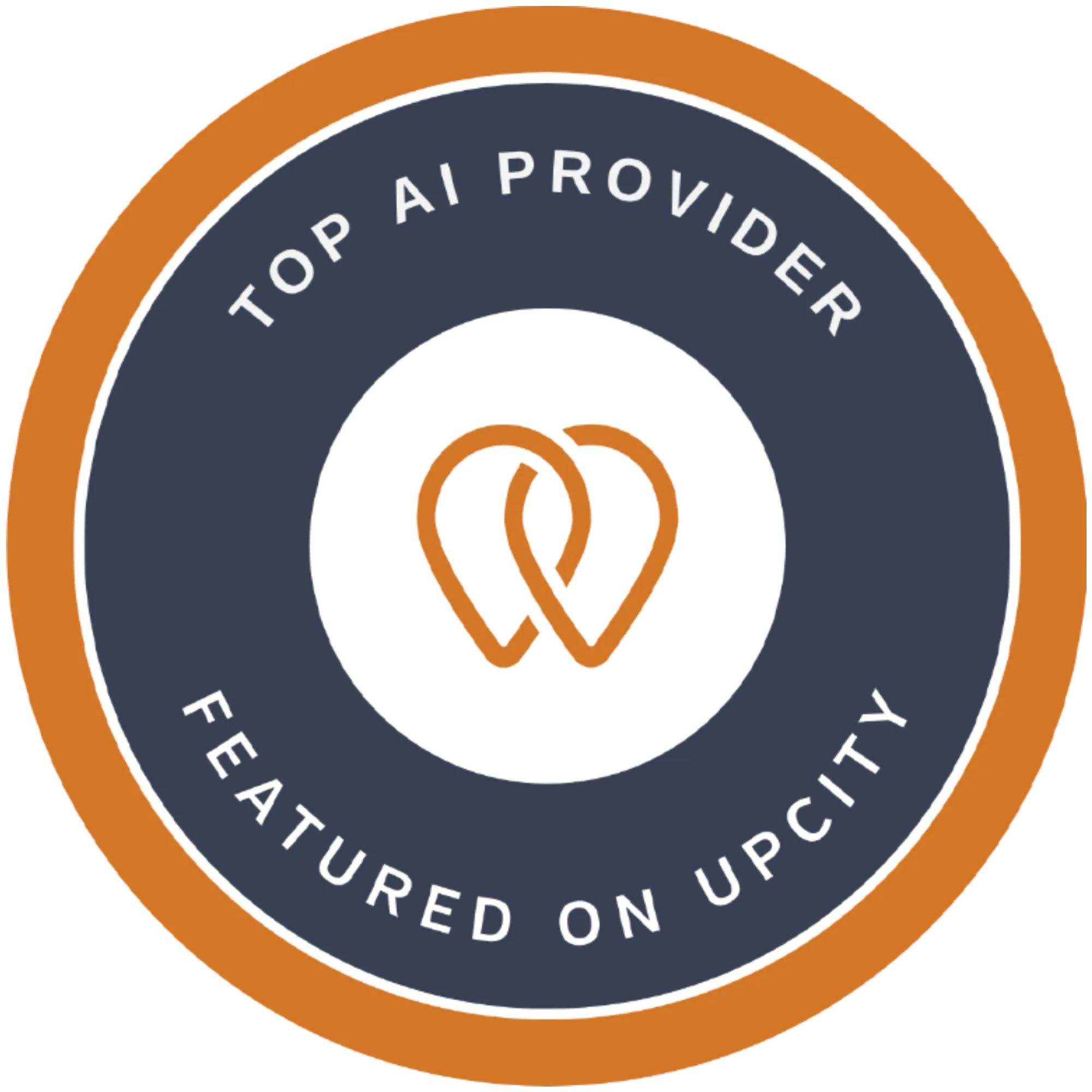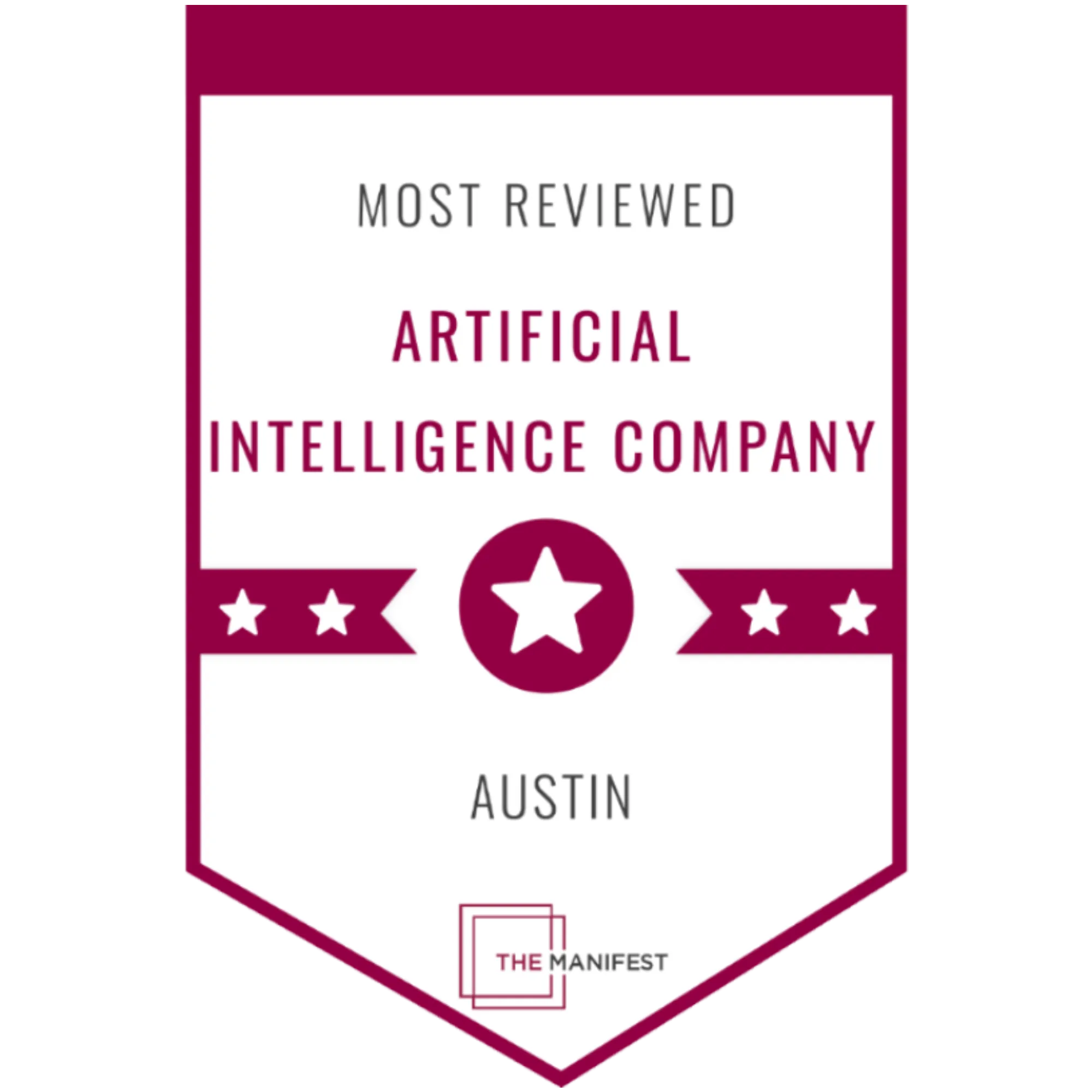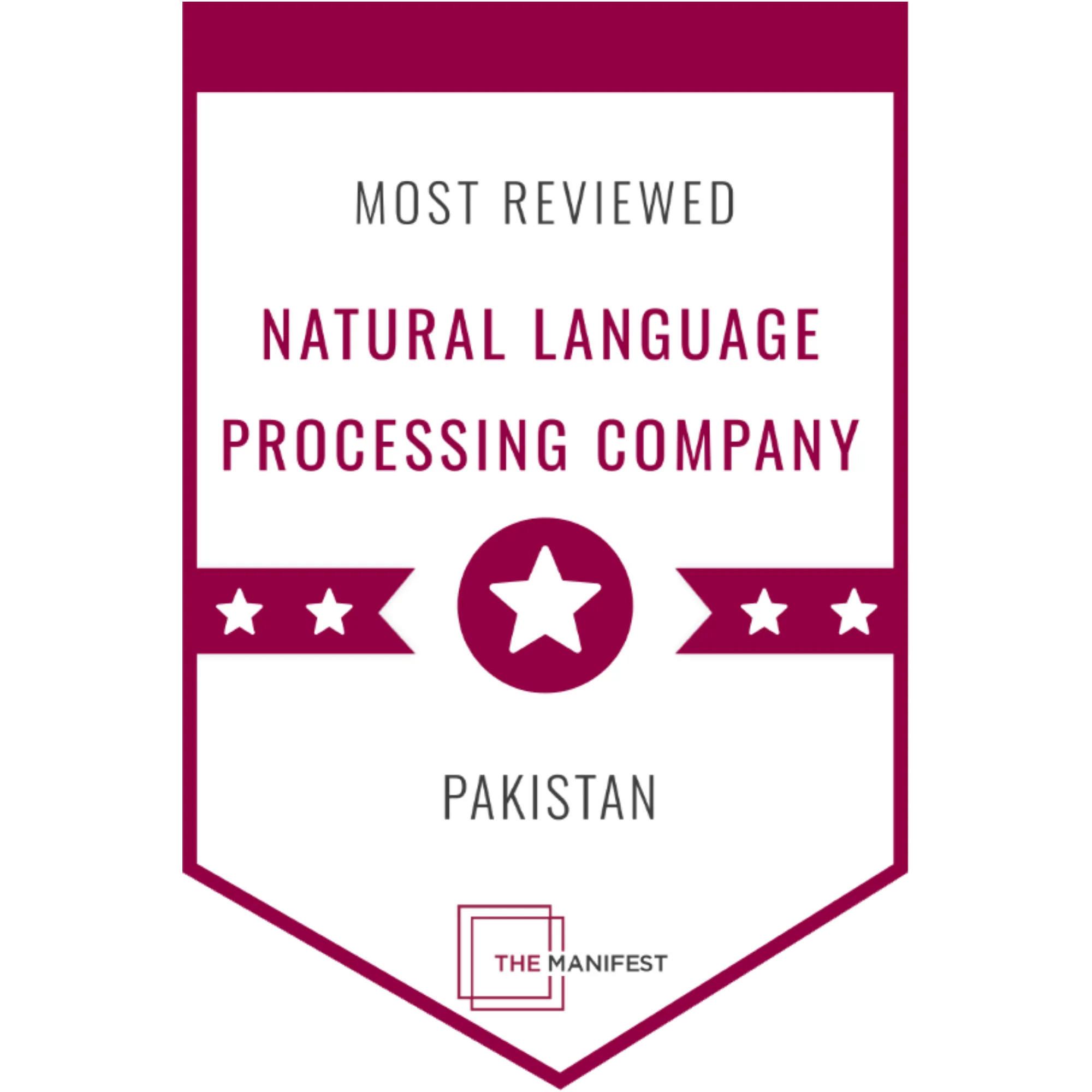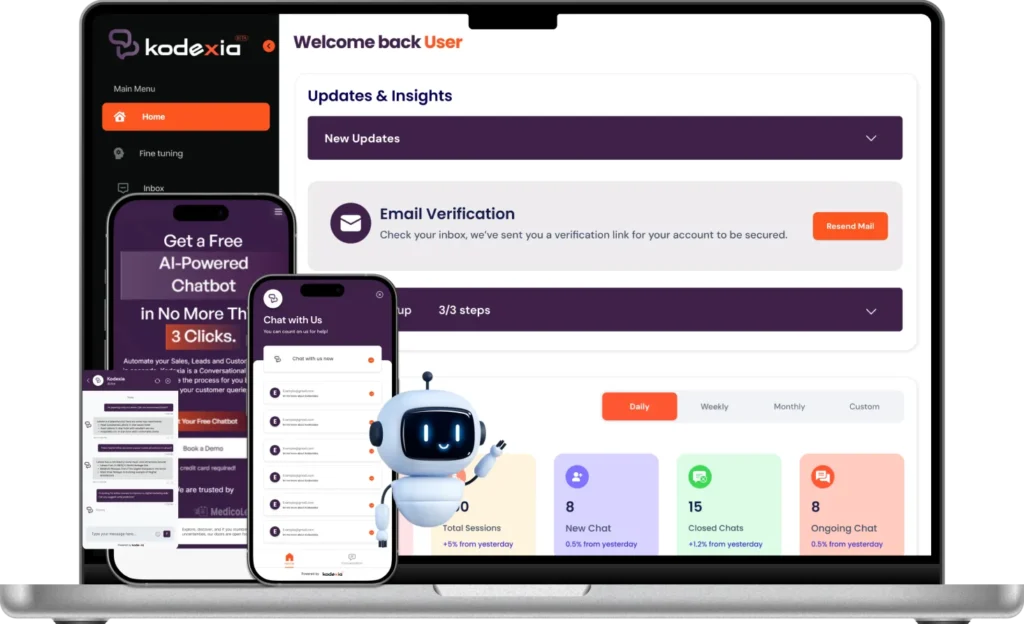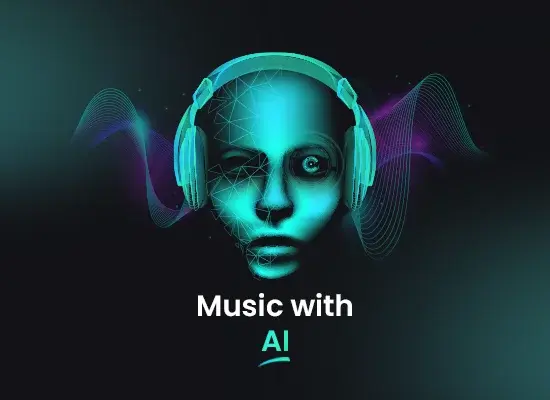
Contents
Music has entered a new era, and artificial intelligence (AI) is playing a key role in shaping it. From composing songs to producing entire tracks, AI is revolutionizing the way we create music. Let’s explore how you can use AI to enhance your music-making process.
What Is Music with AI?
Artificial Intelligence (AI) in music means using technology to help create and produce music. It can compose melodies, generate beats, and even write lyrics. AI works by analyzing vast amounts of music data and recognizing patterns.
Imagine AI as a robot that studies thousands of songs. It learns how they are structured and uses that knowledge to create new music.
Using music with AI can speed up your creative process and bring fresh ideas when you’re stuck. It’s like having a smart partner that assists you in making music.
Music with AI: A Game-Changer
AI in music refers to using technology to enhance different parts of the music with AI experience. Whether it’s creating new music with AI, analyzing song lyrics, or generating playlists, AI tools offer endless possibilities. These tools use Machine Learning (ML) and other technologies to improve over time, learning from data engineering services and user preferences.
Think of AI as a digital DJ who knows your favorite songs and introduces you to new ones based on what you love.
According to Zipdo, more than 50% of musicians believe AI will be composing Top 40 hits within 10 years. With AI, you can discover new songs, create personalized playlists, or even write music faster.
Key Benefits:
- AI helps you create faster.
- Personalized music with AI recommendations.
- AI-generated song lyrics.
- Song sentiment and theme analysis.
- Music discovery based on your preferences.
- It generates new ideas when you’re feeling blocked.
- AI can adapt to your preferred music style.
- You get professional results with less effort.

AI Music Generation: Creating Songs Instantly
AI music generation is the process where AI creates entire songs. You give the AI input, such as a genre or mood, and it generates a melody or beat that fits your description.
You want a chill, relaxing track for background music. AI development can instantly create one for you, based on your preferences.
These tools are perfect for when you need inspiration or want to explore new styles. Here are some AI music generation tools to try:
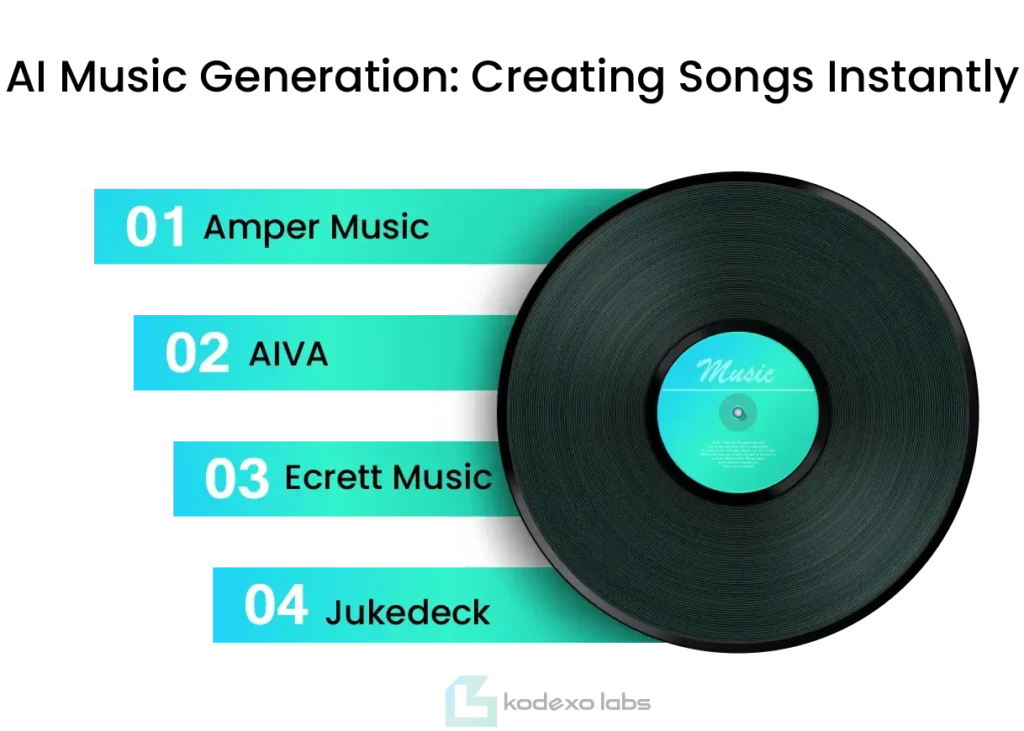
- Amper Music: A simple tool that creates music with AI based on your input.
- AIVA: Specializes in emotional, orchestral compositions.
- Ecrett Music: Designed for creating background music with AI quickly.
- Jukedeck: Produces unique, royalty-free music with AI for videos and games.
Why Use AI Music Generation?
- It helps spark new creative ideas.
- You can experiment with different genres and moods.
- It’s great for when you need quick, ready-to-use music.
- AI-generated music saves time.
AI-Powered Music Composition: How It Works?
AI-powered music composition allows AI to compose full songs. This includes structuring them with verses, choruses, and bridges. The AI learns from various songs and improves as it receives feedback.
You want to write a pop song. The AI creates the melody, rhythm, and structure of the song for you, based on the style you chose.
Popular tools for AI music composition include:
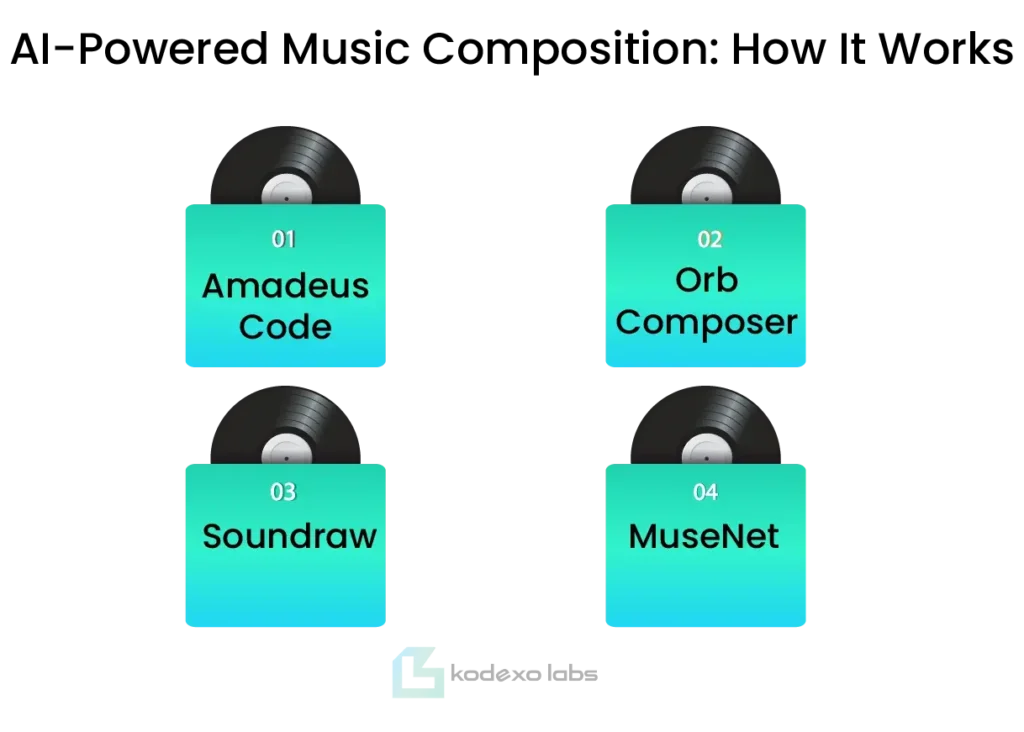
- Amadeus Code: Helps generate melodies and song structures.
- Orb Composer: Designed for more detailed, complex compositions.
- Soundraw: Ideal for quickly composing unique songs.
- MuseNet: AI that creates complex compositions in various genres.
Why Choose AI-Powered Composition?
- It helps you create complete songs from scratch.
- The AI can adapt to different music styles.
- AI improves its results with use.
- It reduces the time spent on structuring songs.
AI Music Software for Music Production:
AI music software automates parts of the music production process, making it easier for you to create professional tracks. These tools predict what sounds good together and assist with production tasks like adding effects and adjusting audio levels.
You’re producing a track, and the AI suggests the best bassline or drum pattern to match your song.
Some of the best AI music production tools include:
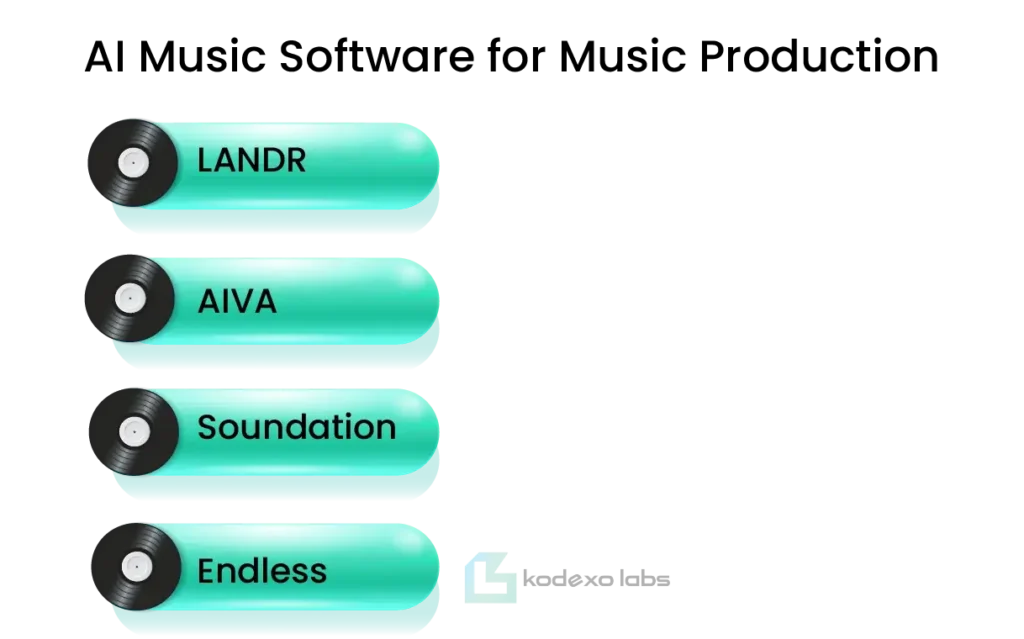
- LANDR: Uses AI for mastering and ensuring high-quality sound.
- AIVA: Assists with both composition and production.
- Soundation: A web-based DAW with AI tools for fast production.
- Endlesss: Allows real-time collaboration and AI-generated beats.
How AI Music Software Helps?
- It automates repetitive tasks like adjusting audio levels.
- You get suggestions for improving your tracks.
- AI speeds up the production process.
- It ensures your music has a professional sound.
Automated Music Production: Simplify Your Workflow
Automated music production means letting AI handle tedious tasks, like balancing track volumes or choosing the right effects. With AI, you can focus more on creativity while the software takes care of the technical details.
You’ve recorded a song, but adjusting each track is time-consuming. An AI tool can automatically balance the sound, leaving you more time for the creative aspects.
Here are some tools for automated music production:
- LANDR: Automates mixing and mastering for professional sound.
- Loudly: Creates music automatically with AI.
- Endlesss: Focuses on real-time collaboration and automated production.
- AIVA: Combines composition and production in one tool.
Why Use Automated Production?
- It saves time by automating repetitive tasks.
- You can focus more on the creative process.
- AI ensures consistent, high-quality production.
- It helps you achieve a professional sound without much effort.
AI-Assisted Mixing and Mastering: Polishing Your Music
Mixing and mastering are critical for producing polished music with AI. AI can assist by automatically balancing track levels, applying EQ, and making your music sound professional without much manual work.
You’ve finished your song but need to mix it. Instead of manually adjusting each sound, AI tools can do the hard work for you.
Some AI mixing and mastering tools include:
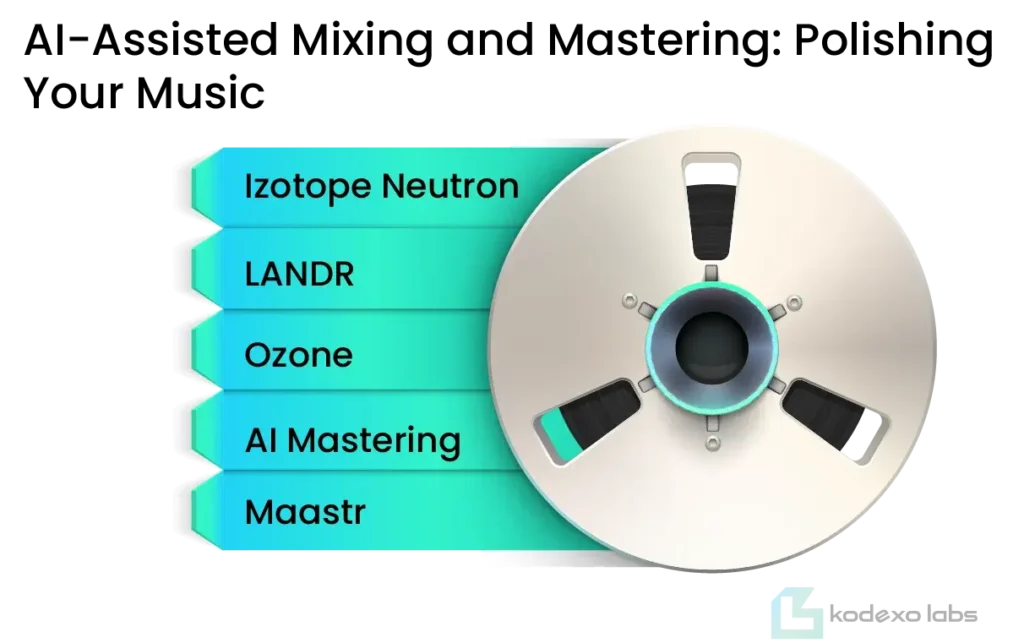
- Izotope Neutron: Analyzes your track and offers mixing suggestions.
- LANDR: Provides automated mastering for polished results.
- Ozone: Uses AI to help fine-tune the final product.
- AI Mastering: Offers automated mastering for a professional touch.
- Maastr: An easy-to-use tool for fast mastering results.
Benefits of AI-Assisted Mixing and Mastering:
- It saves hours of work by automating adjustments.
- AI ensures your track sounds professional.
- You get suggestions to improve the overall sound.
- Even beginners can achieve expert-level quality.
Generative Music Algorithms: AI’s Creativity at Work
Generative music algorithms are the rules AI follows to create music. These algorithms analyze patterns in existing music with AI’s help and create new pieces based on those patterns.
If you give AI a jazz melody, it can generate new jazz music by following the patterns it learned from similar songs.
Popular tools that use generative music algorithms include:
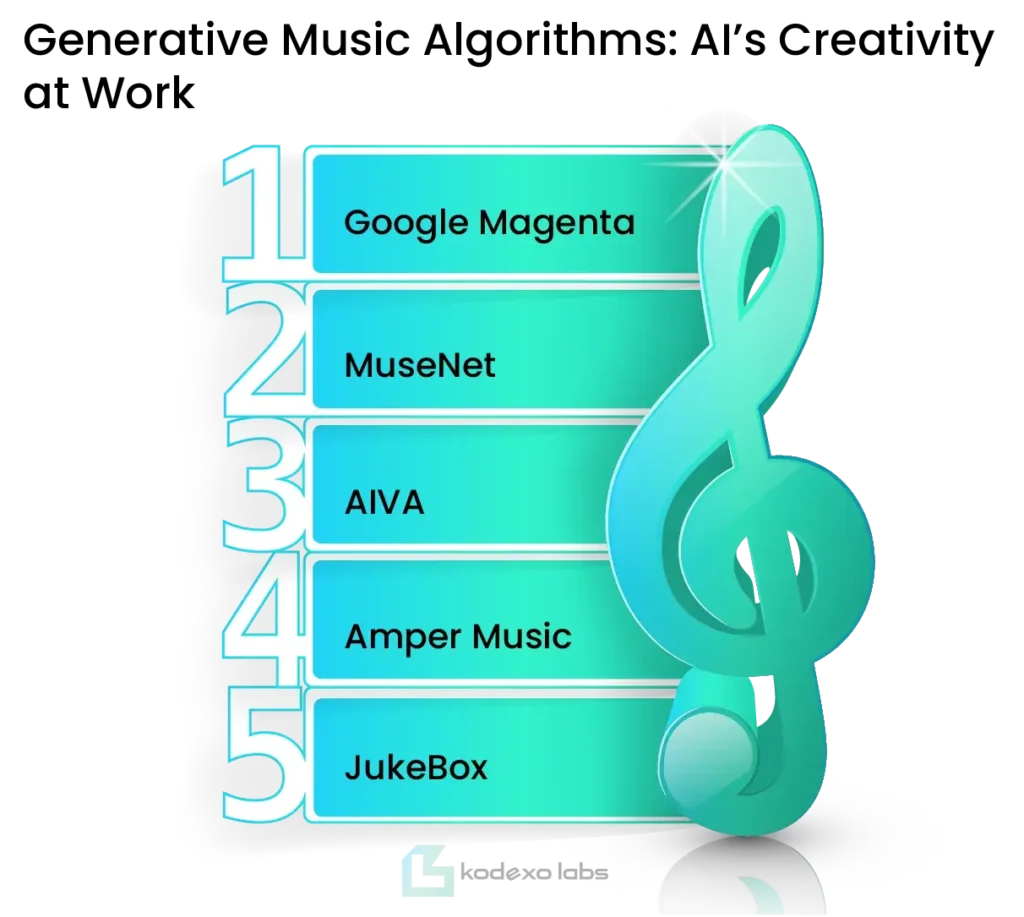
- Google Magenta: Uses AI to create music and art.
- MuseNet: A deep learning AI model that can compose complex music.
- AIVA: Focuses on emotional, classical-style compositions.
- Amper Music: Uses algorithms to compose royalty-free music with AI.
- JukeBox: A neural network that generates music in various styles.
Why Generative Music Algorithms Matter?
- They allow AI to create endless variations of music.
- The AI can produce unique compositions based on your input.
- You get fresh and unpredictable results.
- It’s perfect for exploring new musical ideas.
AI-Generated Lyrics: Writing Songs with AI
AI-generated lyrics can assist you in writing song lyrics. These tools use natural language processing (NLP) to generate lyrics that match the mood or theme you provide.
You want lyrics about love and friendship. The AI generates a set of lyrics based on those themes.
Some AI lyric tools include:
- LyricStudio: Helps generate lyrics from scratch.
- Jarvis: Uses AI to assist with songwriting.
- Audoir: Creates unique, AI-generated lyrics.
- Amper Music: Assists with both music and lyric creation.
- SongLyricsGenerator: Instantly produces lyrics based on your input.
Why Use AI for Lyrics?
- It saves time when you’re stuck on lyrics.
- AI can match lyrics to your music’s mood.
- You can explore different themes and word choices.
- AI tools are a great source of inspiration.
Machine Learning in Music: The Heart of AI Tools
Machine learning (ML) powers most AI tools in music. By analyzing huge amounts of data, AI and machine learning development allows AI to learn and create better compositions, beats, and lyrics over time.
If the AI studies a lot of pop songs, it can identify what makes them successful and generate similar music for you.
Here are some key uses of machine learning in music:
- Chord Progression Suggestions: AI learns which chords work well together.
- Melody Creation: AI generates melodies based on user inputs.
- User Preferences: AI learns from your previous tracks and adapts.
- Audio Mixing: AI analyzes and adjusts sound levels automatically.
- Music Genre Adaptation: AI generated music in your preferred style.
Why Machine Learning Is Important?
- It allows AI to get better the more it’s used.
- The AI adapts to your style over time.
- You can create personalized music with AI faster.
- Machine Learning development tools provide smarter suggestions for your compositions.
Digital Audio Workstations with AI: Streamlining Music Creation
Digital audio workstations (DAWs) with AI features help you create, edit, and produce music efficiently. These tools combine traditional DAW functions with AI technology to offer smarter suggestions and automation.
An AI-powered DAW might suggest the perfect drum loop for your song or adjust audio levels automatically to enhance the mix.
Top DAWs with AI features include:
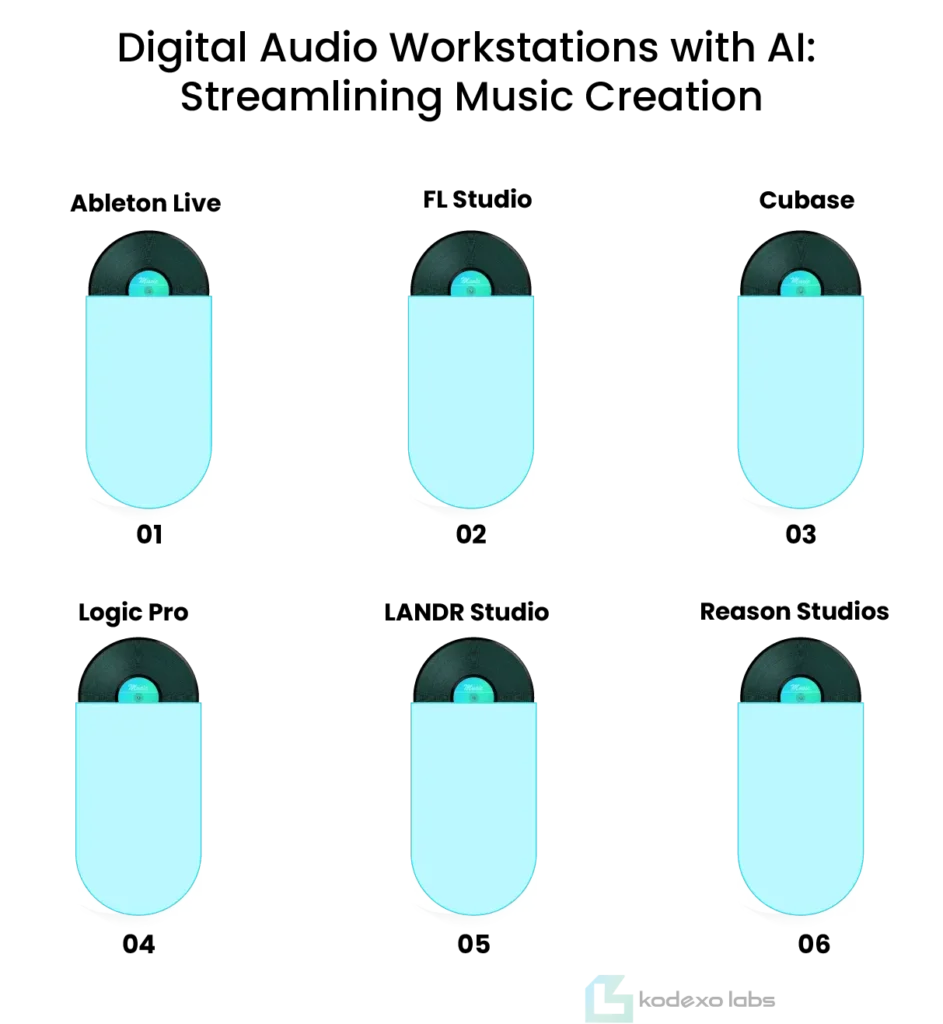
- Ableton Live: Integrates AI for music production tasks.
- FL Studio: Includes AI plugins to streamline the production process.
- Cubase: Combines AI-driven tools with a traditional DAW.
- Logic Pro: Offers AI-powered features for improved workflow.
- LANDR Studio: A cloud-based DAW with AI mastering tools.
- Reason Studios: AI assists with sound design and composition.
Why Use AI-Powered DAWs?
- AI suggests improvements to your tracks.
- It automates many tedious production tasks.
- You can create music with AI more quickly and easily.
- AI ensures your tracks sound professional from start to finish.
Smart Music Production Tools: Making Creation Easier
Smart music production tools analyze your input and suggest the best next steps, whether it’s composing a new melody or adjusting audio effects. These tools make creating music with AI faster and more intuitive.
You’re stuck on a melody. AI listens to your track and suggests several new melody options based on your song’s mood.
Popular smart production tools include:
- Orb Producer: Helps generate smart chord progressions and melodies.
- BandLab: Offers AI tools for all stages of music production.
- Endlesss: AI suggests beats and melodies for collaborative projects.
- Amper Music: Smart tool for creating quick music with AI compositions.
- Soundraw: Generates unique music with AI based on your inputs.
- Hookpad: Suggests the best chord progressions for your song.
How Smart Tools Help?
- They provide suggestions to improve your track.
- AI reduces creative block by offering fresh ideas.
- These tools are easy to use, even for beginners.
- AI helps you produce polished tracks quickly.
Intelligent Music Creation: The Future of Songwriting
Intelligent music creation is about using AI to spark creativity. AI becomes your partner in the creative process, offering new ideas and helping you shape your song.
You give AI a basic chord progression, and it builds a full song around it, including a melody, rhythm, and structure.
Top tools for intelligent music creation include:
- AIVA: Specializes in classical-style, emotional compositions.
- Amper Music: An easy tool for quick music creation.
- Orb Composer: Offers detailed compositions based on AI input.
- Endlesss: A collaborative tool that uses AI for real-time music creation.
- Soundraw: Smart, AI-generated music for unique compositions.
- MuseNet: Generates complex compositions in various styles.
Why Intelligent Music Creation Is the Future?
- AI offers endless new ideas for compositions.
- You can explore new music with AI genres and styles.
- It helps streamline the songwriting process.
- AI can assist in writing full songs, from melody to lyrics.
Natural Language Processing for Songwriting: AI-Powered Lyrics Creation
Natural language processing for songwriting uses AI to help generate song lyrics. The AI understands human language and can create lyrics based on the theme or emotion you want to convey. This is great for overcoming writer’s block or just trying something new.
Let’s say you’re trying to write a happy song about summer. You provide AI with that theme, and it quickly generates lyrics that match your vision.
Here are some AI-powered tools that use natural language processing for songwriting:
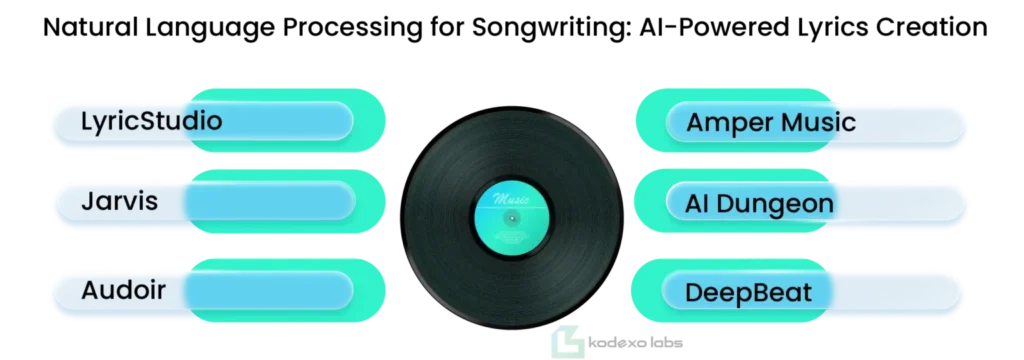
- LyricStudio: Provides instant lyrics based on a theme.
- Jarvis: Assists in writing lyrics through AI-generated suggestions.
- Audoir: Offers lyrics with emotional depth using NLP.
- Amper Music: Generates lyrics and music simultaneously.
- AI Dungeon: A creative tool that helps generate complex narratives and lyrics.
- DeepBeat: An AI tool focused on creating rap and poetic lyrics.
Why NLP for Songwriting is Essential?
- It helps you quickly generate lyric ideas.
- AI matches lyrics to the emotion or theme of your song.
- It saves time when you’re stuck or need inspiration.
- AI learns from feedback to generate better lyrics.
- You can easily tweak the output to match your style.
- NLP helps create consistent and thematic lyrics.
Machine Learning for Lyrics Creation: Smarter Songwriting with AI
Machine learning for lyrics creation allows AI to improve over time by learning from large amounts of music data. These AI tools use patterns in music and lyrics to create more natural, human-like text.
You’re writing a pop song and need help with the chorus. The AI suggests a catchy chorus that aligns with the genre, thanks to its machine learning capabilities.
Here are the top machine learning lyrics creation tools:
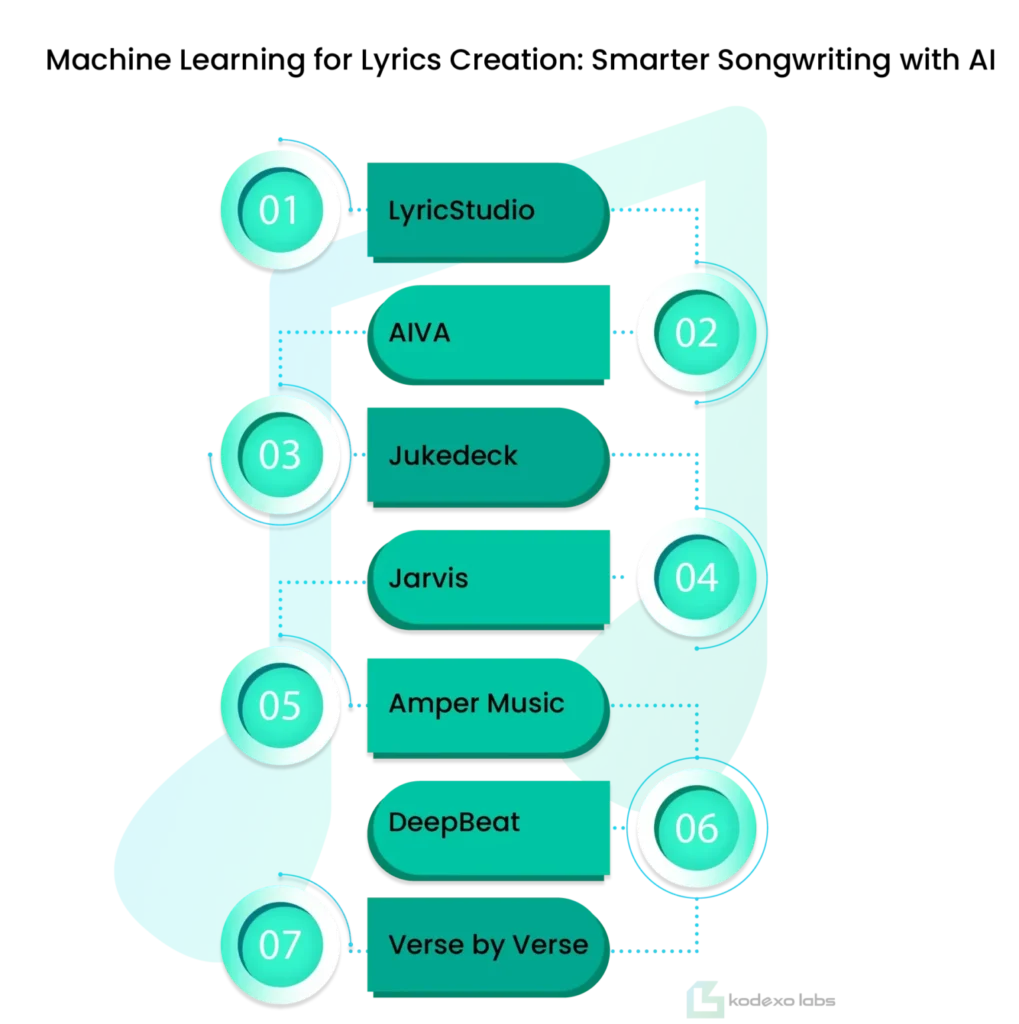
- LyricStudio: Learns from your input to improve its lyric creation.
- AIVA: Uses machine learning to create complete songs with lyrics.
- Jukedeck: AI-driven platform that can generate music and lyrics.
- Jarvis: Provides AI-assisted songwriting through machine learning.
- Amper Music: Generates both lyrics and music with AI based on user preferences.
- DeepBeat: Specializes in rap lyrics creation using AI.
- Verse by Verse: A Google project that uses AI to create poetry and song lyrics.
Benefits of Machine Learning for Lyrics Creation:
- It helps generate unique and personalized lyrics.
- AI improves with more input, creating better results over time.
- You can create lyrics in any genre, from pop to hip-hop.
- Machine learning tools allow for quick adjustments to lyrics.
- They offer genre-specific suggestions for better results.
- These tools save time by speeding up the lyric-writing process.
- AI adapts to your specific style and preferences.
AI Music Recommendation Systems: Discovering Music You’ll Love
AI music recommendation systems help you find songs and artists based on your listening habits. These tools use AI to analyze what you’ve listened to and suggest similar songs you might like.
Example: You’ve been listening to a lot of indie rock lately. The AI recognizes this pattern and suggests new indie bands that match your taste.
Popular AI music recommendation systems include:
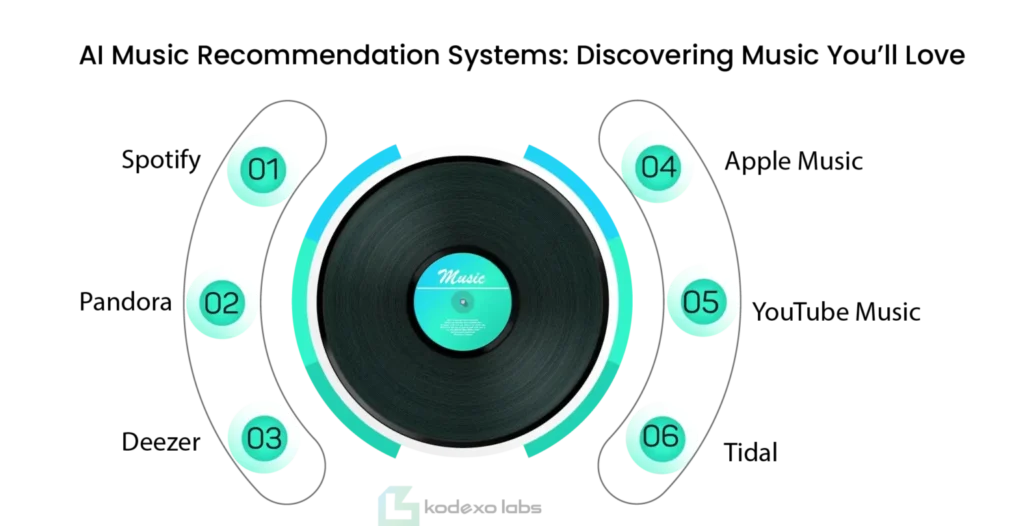
- Spotify: Uses AI to create playlists like “Discover Weekly.”
- Pandora: Recommends songs based on specific attributes like tempo and rhythm.
- Deezer: Offers personalized music suggestions based on your listening history.
- Apple Music: Curates playlists with AI based on your preferences.
- YouTube Music: Recommends new music videos and songs.
- Tidal: Uses machine learning to find lesser-known artists.
Why AI Music Recommendation Systems Work?
- AI understands your listening habits and suggests songs accordingly.
- You discover new music based on genres you already love.
- The AI continually adapts to your evolving tastes.
- It’s a hands-free way to find new tracks.
- You save time by not having to manually search for new music.
- AI makes suggestions based on mood, activity, or time of day.
Personalized Music Playlists with AI: Tailored to Your Taste
Personalized music playlists with AI use machine learning to create unique playlists just for you. These playlists evolve as you listen to more songs, making your experience truly personal.
You prefer upbeat songs for working out, so AI creates a workout playlist filled with energetic tracks.
Here are some tools for creating personalized music playlists with AI:
- Spotify’s Daily Mix: Automatically updates playlists based on your listening habits.
- Deezer Flow: Offers an endless stream of personalized music.
- Pandora’s Thumbprint Radio: Curates playlists from your liked songs.
- Apple Music’s New Music Mix: Introduces new tracks each week based on your preferences.
- Amazon Music’s My Soundtrack: AI-generated playlist based on your past listens.
- Tidal’s Rising Playlist: Focuses on emerging artists that match your taste.
Benefits of Personalized Music Playlists with AI:
- You get fresh, new music daily without searching.
- Playlists adjust to your changing tastes.
- AI matches playlists to your mood or activity.
- Discover new genres and artists easily.
- AI-driven playlists save you time.
- It’s a simple way to keep your music experience engaging.
Machine Learning for Music Discovery: Uncovering Hidden Gems
Machine learning for music discovery helps you find new music by analyzing what you already listen to. The AI looks at song structure, genre, and your past favorites to suggest music you might enjoy.
You like lo-fi beats, and AI suggests new artists in this genre based on the tempo and vibe of songs you’ve listened to before.
Top tools for machine learning for music discovery include:
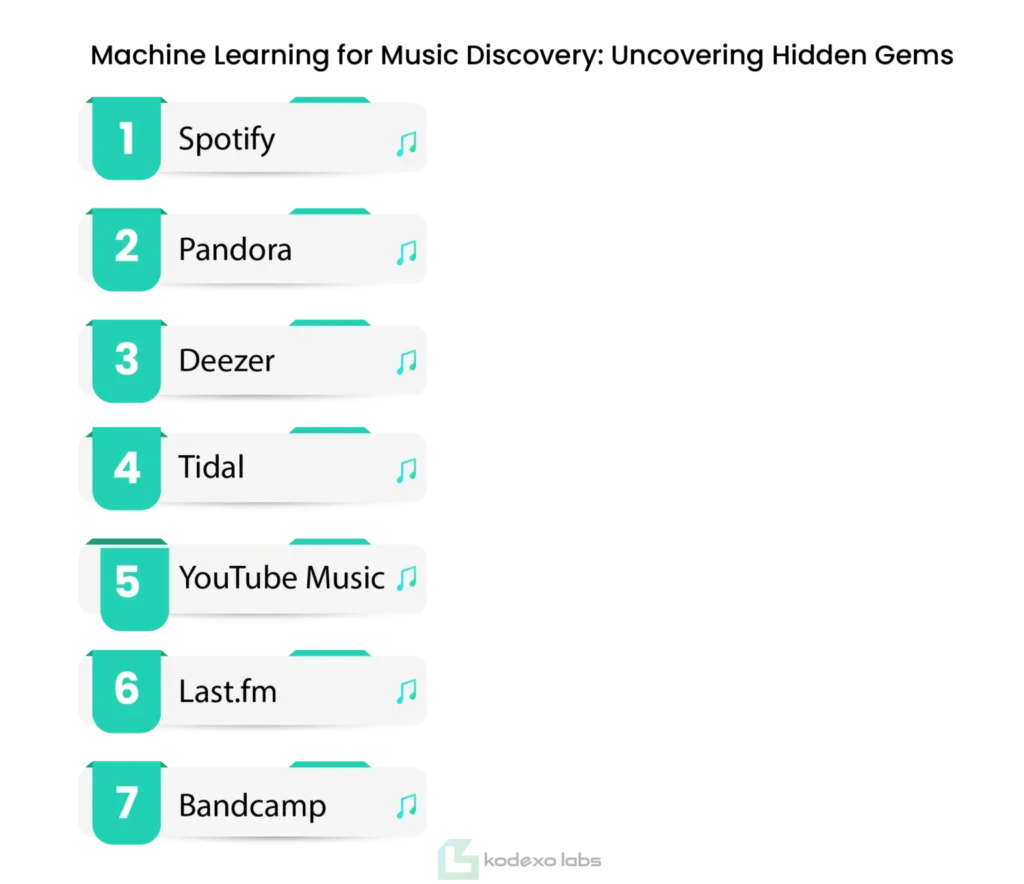
- Spotify: Uses machine learning to recommend songs in “Discover Weekly.”
- Pandora: Analyzes song attributes to suggest music in your preferred genre.
- Deezer: Uses AI to find songs from new artists that match your taste.
- Tidal: Offers recommendations based on listening patterns.
- YouTube Music: Suggests videos and music based on your history.
- Last.fm: Tracks your listening habits and recommends new music.
- Bandcamp: Uses machine learning to suggest independent artists.
Why Machine Learning for Music Discovery is Useful?
- AI helps you find music from lesser-known artists.
- It analyzes song attributes to find what you’ll enjoy.
- AI recommendations evolve with your changing taste.
- Machine learning saves time by suggesting music that fits your style.
- AI ensures you never run out of fresh music to explore.
- It helps you find hidden gems you may have missed otherwise.
- AI offers suggestions tailored to specific moods and activities.
Conversational AI for Music Discovery: Let AI Suggest Songs
Conversational AI for music discovery lets you ask questions and get instant music suggestions. You can talk to these AI tools like a friend, and they’ll recommend music based on what you tell them.
You ask, “What’s a good song to relax to?” The AI suggests a chilled playlist that fits your mood.
Popular conversational AI for music discovery tools include:
- Google Assistant: Recommends songs based on your queries.
- Siri: Offers music suggestions based on your mood or activity.
- Spotify Voice Search: Lets you search for songs with your voice.
- Pandora’s Voice Mode: Suggests music through voice commands.
- Alexa: Recommends playlists or individual songs based on your preferences.
- YouTube Music Voice Search: Finds music videos and songs with voice commands.
- SoundHound: Recognizes songs and suggests new tracks based on your input.
Why Conversational AI for Music Discovery is Handy?
- You get personalized recommendations quickly.
- AI suggests songs based on mood or activity.
- It’s hands-free and easy to use while multitasking.
- AI adapts to your taste with continued use.
- It helps you find music through casual conversation.
- Voice search is convenient and efficient.
- AI learns from your feedback to improve future recommendations.
Chatbots for Music Recommendations: Quick Suggestions with AI
Chatbots for music recommendations provide instant suggestions through a chat interface. You tell the bot what you’re looking for, and it recommends songs based on your input.
You message a chatbot and say, “I want to listen to something upbeat.” The chatbot replies with a list of energetic tracks that match your mood.
Top chatbots for music recommendations include:
- Spotify’s Messenger Bot: Offers song and playlist recommendations via chat.
- Pandora’s Chatbot: Helps you find new music by chatting with an AI.
- Apple Music’s iMessage Bot: Recommends songs and playlists through iMessage.
- YouTube Music Bot: Provides music suggestions through chat-based interaction.
- Amazon Alexa Bot: Suggests music based on your chat inputs.
- Deezer’s Chatbot: Offers personalized music suggestions through text.
- Tidal’s Chatbot: Recommends new artists and tracks through AI interaction.
- Musicovery Chatbot: A chatbot that helps you find music based on mood and genre.
Why Chatbots for Music Recommendations are Helpful?
- You get instant song suggestions without browsing.
- Chatbots provide personalized recommendations based on your mood or activity.
- It’s a fun and easy way to discover new music.
- AI chatbot development adapts to your taste with time.
- You can ask for specific genres or themes and get results quickly.
- Chatbots provide a casual and conversational music discovery experience.
- They help you find music when you’re unsure of what to listen to.
- AI-powered chatbots can introduce you to new genres and artists.
Computational Musicology: Studying Music with AI
Computational musicology uses AI to study music patterns and structures. This field helps us understand what makes music tick.
According to a Music Business Worldwide,100 million AI-generated tracks have been created by music platforms. Imagine AI analyzing thousands of songs to find common chord progressions in pop music.
With computational musicology, you can uncover trends and patterns that can inspire your own music. It’s like having a data scientist who loves music.
Benefits:
- Discover popular music trends.
- Analyze complex musical structures.
- Understand genre-specific patterns.
- Enhance your songwriting with data insights.
- Predict future music trends.
- Improve music education with AI insights.
- Create music that resonates with audiences.
- Optimize your compositions for better reception.
AI-Driven Music Analysis: Unlocking Song Insights
AI-driven music analysis helps you understand your music better. It breaks down songs to reveal hidden elements and emotions.
You can use AI to see how different parts of your song make listeners feel.
This tool is great for improving your music and connecting with your audience on a deeper level.
- Analyze song structure and composition.
- Detect emotional tones in music.
- Identify key themes in lyrics.
- Measure the impact of different instruments.
- Track changes in music trends.
- Compare your music with top hits.
- Gain insights into listener preferences.
- Enhance your music marketing strategies.
Music Sentiment Analysis: Gauging Emotions in Songs
Music sentiment analysis uses AI to determine the emotions conveyed in a song. It helps you understand how your music affects listeners.
AI can tell you if your song feels happy, sad, or energetic.
This tool is useful for creating music that resonates emotionally with your audience.
- Create emotionally impactful songs.
- Tailor music for specific moods.
- Enhance storytelling in your lyrics.
- Improve audience connection.
- Refine your music style based on feedback.
- Develop targeted playlists.
- Boost your music’s emotional appeal.
- Increase listener engagement through emotion-driven content.
Sentiment Analysis in Song Lyrics: Understanding Your Words
Sentiment analysis in song lyrics uses AI to evaluate the emotions behind your words. It helps you craft lyrics that convey the right feelings.
If you write a love song, AI can ensure your lyrics sound heartfelt and genuine.
This tool aids in writing lyrics that truly connect with your audience.
- Enhance the emotional depth of your lyrics.
- Ensure consistency in your song’s message.
- Avoid unintended negative emotions.
- Improve lyrical storytelling.
- Tailor lyrics to your target audience.
- Gain feedback on your lyrical content.
- Refine your songwriting process.
- Create more relatable and impactful songs.
Theme Extraction from Music Content: Finding Your Song’s Heart
Theme extraction from music content uses AI to identify the main ideas in your music. It helps you stay focused on your song’s message.
AI can find that your song is about overcoming challenges and highlight that theme.
This tool ensures your music has a clear and consistent message.
- Identify core themes in your music.
- Ensure thematic consistency across songs.
- Inspire new song ideas based on themes.
- Analyze theme popularity in different genres.
- Tailor themes to audience preferences.
- Enhance lyrical and musical coherence.
- Discover unique themes for originality.
- Integrate themes seamlessly into your compositions.
Topic Modeling for Music Genres: Exploring Musical Styles
Topic modeling for music genres uses AI to categorize music into different styles. It helps you understand and explore various genres.
AI can classify your music as jazz, pop, or rock based on its elements.
This tool is perfect for experimenting with different genres and expanding your musical horizons.
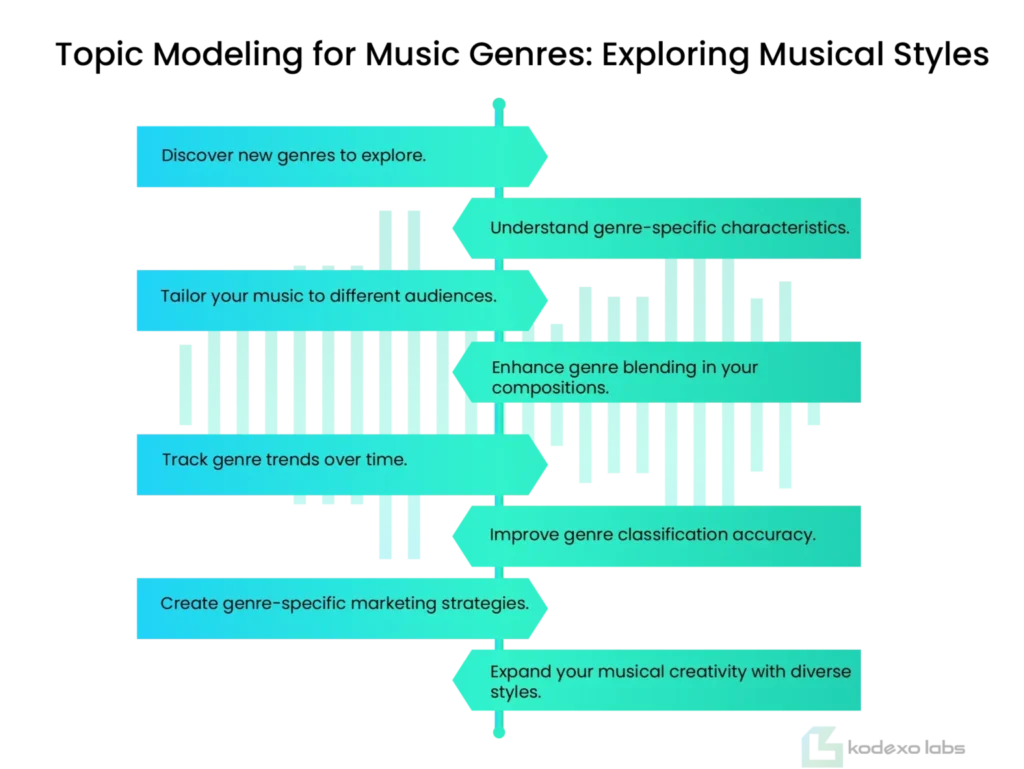
- Discover new genres to explore.
- Understand genre-specific characteristics.
- Tailor your music to different audiences.
- Enhance genre blending in your compositions.
- Track genre trends over time.
- Improve genre classification accuracy.
- Create genre-specific marketing strategies.
- Expand your musical creativity with diverse styles.
AI in Live Performances: Elevating Your Shows
AI in live performances enhances your shows with smart technology. It can manage lighting, sound, and even interact with the audience.
AI can sync your music with dynamic light shows for a better live experience.
This tool makes your performances more engaging and professional.
- Automate stage lighting based on your music.
- Control sound levels for optimal quality.
- Use AI-driven visuals for stunning effects.
- Enhance audience interaction with smart systems.
- Streamline stage management tasks.
- Incorporate real-time feedback into performances.
- Create immersive and memorable shows.
- Improve overall stage production efficiency.
Virtual AI Musicians: Your Digital Band Members
Virtual AI musicians are digital tools that can play instruments or sing along with you. They add depth to your music without needing real band members.
AI can provide a virtual drummer to accompany your guitar playing.
This tool helps you create full-sounding tracks even if you play solo.
- Add realistic instrument sounds to your music.
- Experiment with different instruments easily.
- Save costs on hiring live musicians.
- Enhance your recordings with diverse sounds.
- Create complex arrangements effortlessly.
- Collaborate with AI musicians in real-time.
- Expand your musical capabilities.
- Produce professional-sounding tracks solo.
Interactive AI Music Systems: Engaging with Your Music
Interactive AI music systems allow you to engage with your music in real-time. These systems respond to your inputs, making music creation a dynamic process.
You can change the tempo or key of your song on the fly, and the AI adjusts the music accordingly.
This tool makes creating music more interactive and fun.
- Real-time music adjustments.
- Responsive to your creative inputs.
- Enhance collaboration with AI.
- Facilitate spontaneous music creation.
- Provide instant feedback on your ideas.
- Support improvisation and experimentation.
- Integrate seamlessly with your workflow.
- Make music creation more intuitive and engaging.
AI Voice Synthesis for Music: Bringing Voices to Life
AI voice synthesis for music uses AI to create realistic singing voices. It helps you add vocals to your tracks without needing a singer.
AI can generate a female vocal for your song, matching the style you want.
This tool is perfect for adding professional-sounding vocals to your music.
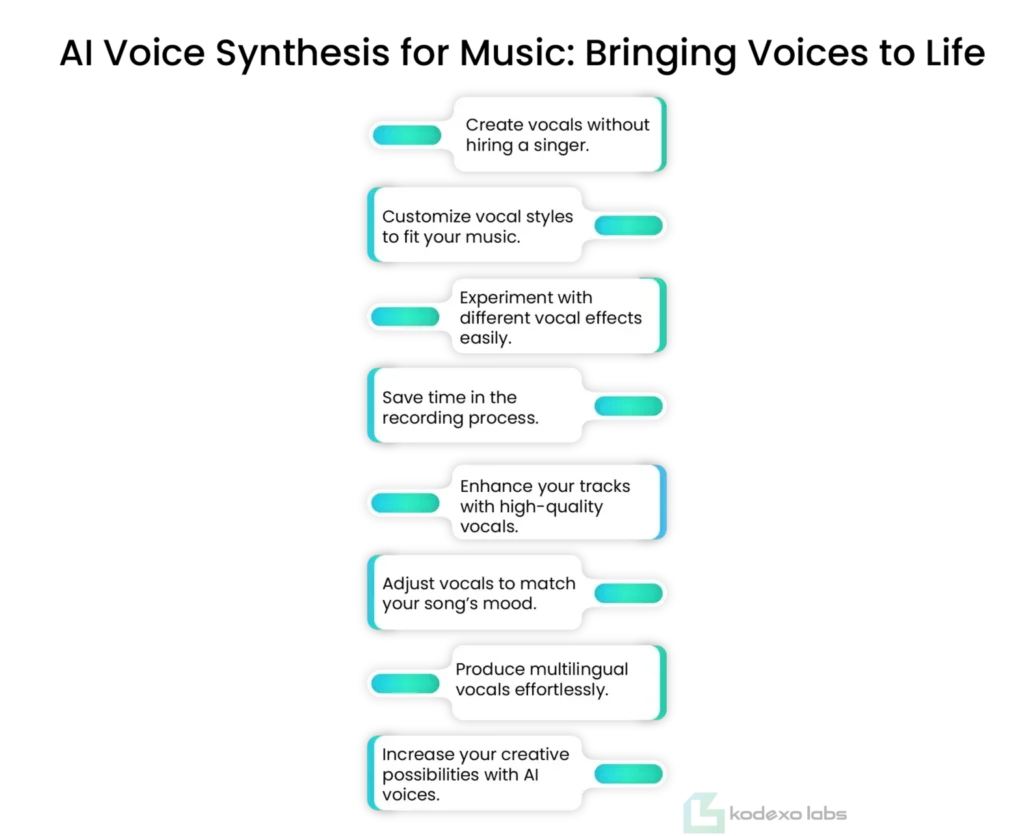
- Create vocals without hiring a singer.
- Customize vocal styles to fit your music.
- Experiment with different vocal effects easily.
- Save time in the recording process.
- Enhance your tracks with high-quality vocals.
- Adjust vocals to match your song’s mood.
- Produce multilingual vocals effortlessly.
- Increase your creative possibilities with AI voices.
Speech-to-Music AI: Turning Words into Tunes
Speech-to-Music AI converts spoken words or phrases into musical elements. This technology analyzes your speech patterns and transforms them into melodies or rhythms.
You speak a sentence, and AI turns it into a catchy tune that fits your words’ rhythm and emotion.
This tool is great for creating unique songs or experimenting with new ideas. It bridges the gap between speech and music creatively.
- Unique Melodies: Create melodies based on your voice.
- Quick Songwriting: Speed up the songwriting process.
- Emotional Expression: Express emotions through music derived from speech.
- Customization: Tailor music to fit specific spoken words.
- Innovative Creativity: Explore new ways to create music.
- Accessibility: Make music creation accessible to everyone.
Natural Language Interfaces for Music Software
Natural Language Interfaces for Music Software allow you to control music tools using everyday language. Instead of clicking buttons, you can simply speak commands to manage your music projects.
You can say, “Add a drum beat here,” and the software will insert a drum track into your song.
This makes music production more intuitive and hands-free. It’s perfect for those who prefer speaking over typing.
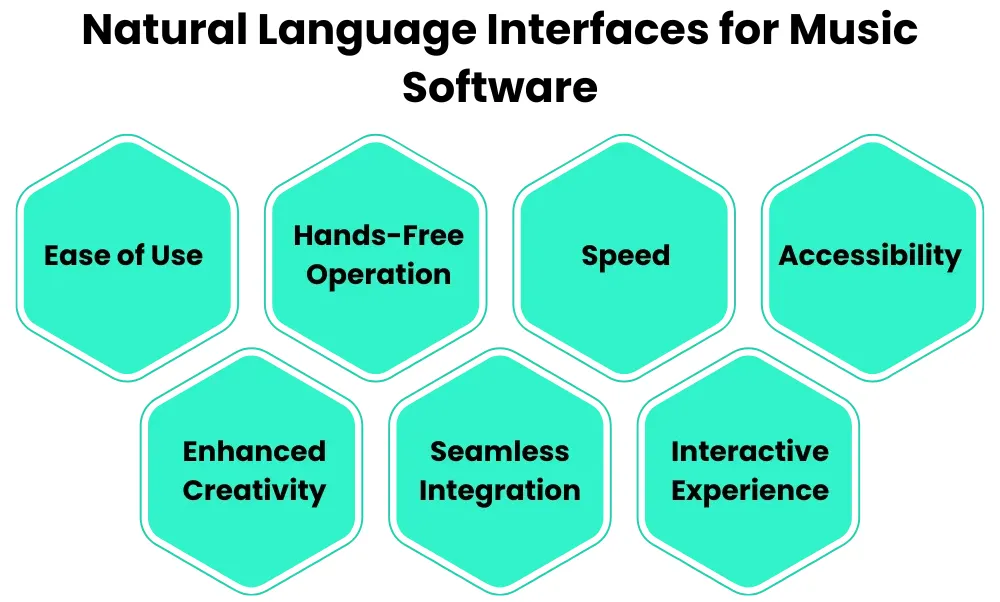
- Ease of Use: Simplifies the music creation process.
- Hands-Free Operation: Control your music software without using hands.
- Speed: Execute commands faster with voice.
- Accessibility: Helps users with disabilities.
- Enhanced Creativity: Focus more on creativity than navigation.
- Seamless Integration: Works smoothly with existing music tools.
- Interactive Experience: Engages users in a more interactive way.
Voice-Controlled Music Applications:
Voice-Controlled Music Applications let you manage your music projects using your voice. These apps respond to your spoken commands, making music creation more interactive.
Tell your app, “Increase the bass,” and it will adjust the bass levels in your track.
Voice control adds a new dimension to music production. It allows for a more natural and fluid workflow.
- Volume Control: Adjust volume levels with your voice.
- Track Management: Add or remove tracks using commands.
- Effect Adjustment: Change effects like reverb or delay through speech.
- Playback Control: Play, pause, or skip tracks by speaking.
- Loop Creation: Create loops by instructing the app.
- Tempo Changes: Speed up or slow down your music with voice.
- Preset Selection: Choose from different presets using commands.
- Real-Time Editing: Make changes on the fly while creating.
NLP for Music Tagging: Organizing Your Music Library
NLP for Music Tagging uses Natural Language Processing to categorize and tag your music library. AI analyzes your songs’ content and assigns relevant tags for easy organization.
AI tags your song with genres like “jazz” or “rock” based on its elements.
This makes searching and managing your music collection effortless. It’s perfect for DJs and music enthusiasts with large libraries.

- Efficient Organization: Easily sort and find your music.
- Accurate Tagging: AI provides precise tags based on song content.
- Time-Saving: Automates the tagging process.
- Improved Searchability: Find songs quickly using tags.
- Consistent Categorization: Maintains uniform tags across your library.
- Enhanced Discovery: Discover new music based on tagged genres.
- User-Friendly: Simple interface for managing tags.
Semantic Analysis in Music Databases:
Semantic Analysis in Music Databases involves AI understanding the meaning behind music content. It analyzes lyrics, melodies, and other elements to categorize and recommend music accurately.
AI understands that a song with melancholic lyrics and slow tempo fits the “sad” mood category.
This helps in creating detailed and meaningful music databases. It enhances music recommendation systems, making them smarter.
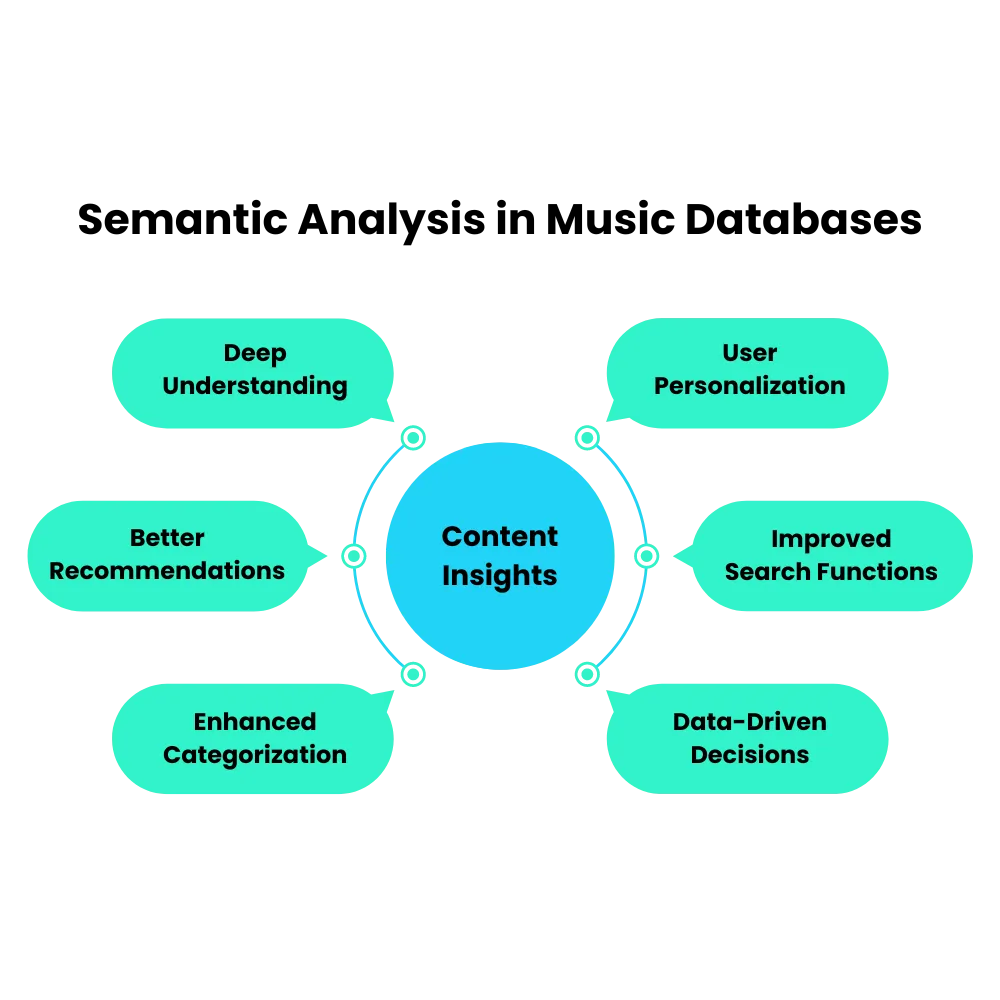
- Deep Understanding: AI grasps the nuances of music content.
- Better Recommendations: Provides accurate music suggestions.
- Enhanced Categorization: Classifies music based on deeper meanings.
- User Personalization: Tailors recommendations to individual tastes.
- Improved Search Functions: Allows for more specific search queries.
- Content Insights: Offers insights into music trends and patterns.
- Data-Driven Decisions: Helps in making informed choices for music curation.
Text Analysis for Music Categorization:
Text Analysis for Music Categorization uses AI to examine lyrics and other textual elements of songs. This helps in categorizing music based on themes, emotions, and topics.
AI analyzes the lyrics of a song about love and categorizes it under “romantic.”
This enhances the way music is sorted and discovered. It’s useful for creating playlists and organizing music libraries.
- Theme Identification: Recognizes the main themes in lyrics.
- Emotion Detection: Identifies the emotions conveyed in songs.
- Topic Classification: Sorts music based on specific topics.
- Enhanced Playlists: Creates more accurate and relevant playlists.
- Improved Discoverability: Makes it easier to find songs based on content.
- Automated Sorting: Streamlines the music categorization process.
- User Engagement: Enhances user interaction with personalized music.
Deep Learning in Music: Enhancing Creativity
Deep Learning in Music involves AI using complex algorithms to learn and create music. This technology mimics how the human brain works to generate innovative musical ideas.
AI learns from thousands of songs and creates a new piece that blends different styles seamlessly.
Deep learning opens up new creative possibilities. It allows for the creation of unique and complex music that was previously unimaginable.
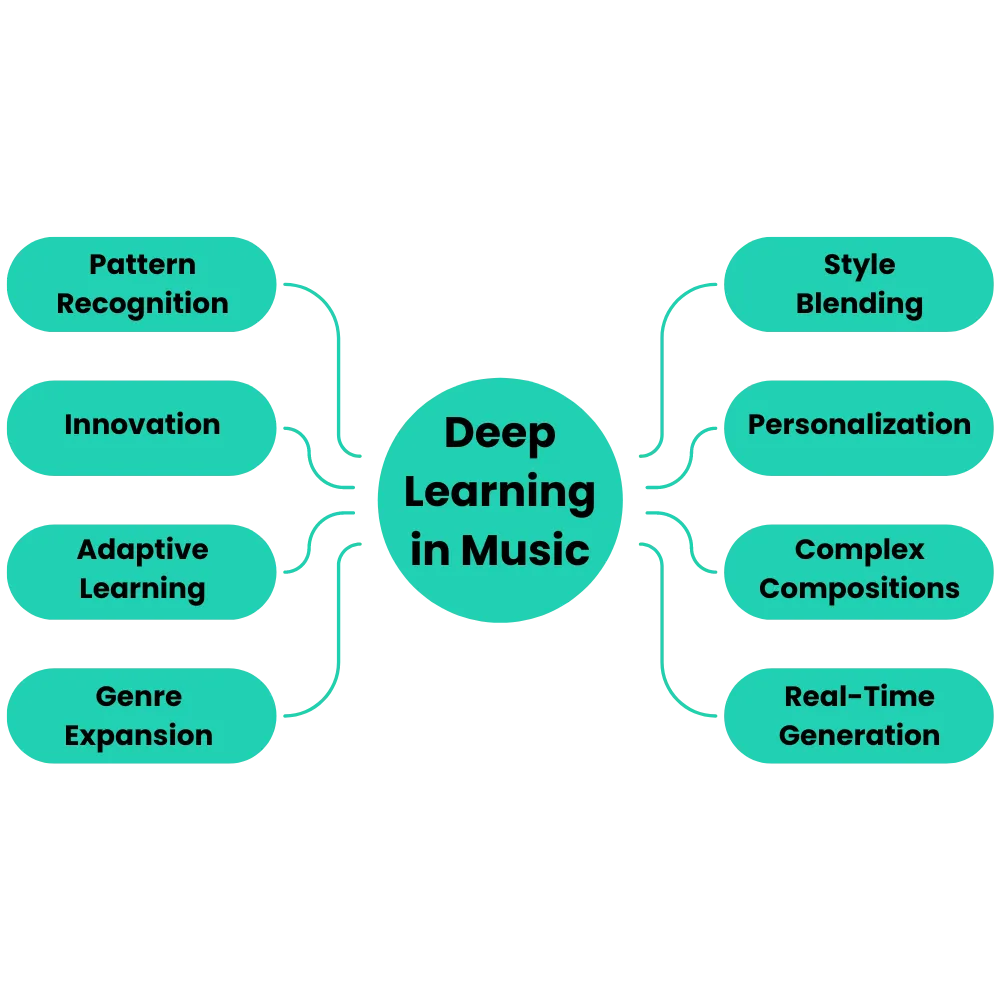
- Pattern Recognition: Identifies patterns in existing music.
- Style Blending: Combines different musical styles creatively.
- Innovation: Generates new and unique musical ideas.
- Adaptive Learning: Adaptive Learning improves its creations based on feedback.
- Complex Compositions: Creates intricate and layered music pieces.
- Genre Expansion: Explores and creates new music genres.
- Real-Time Generation: Produces music on the fly during live sessions.
- Personalization: Tailors music to individual preferences.
Neural Networks for Audio Processing:
Neural Networks for Audio Processing use AI to analyze and modify audio signals. These networks enhance sound quality, create effects, and manipulate audio in various ways.
AI removes background noise from a recording, making the vocals clearer.
This technology is essential for producing high-quality music. It ensures your tracks sound professional and polished.
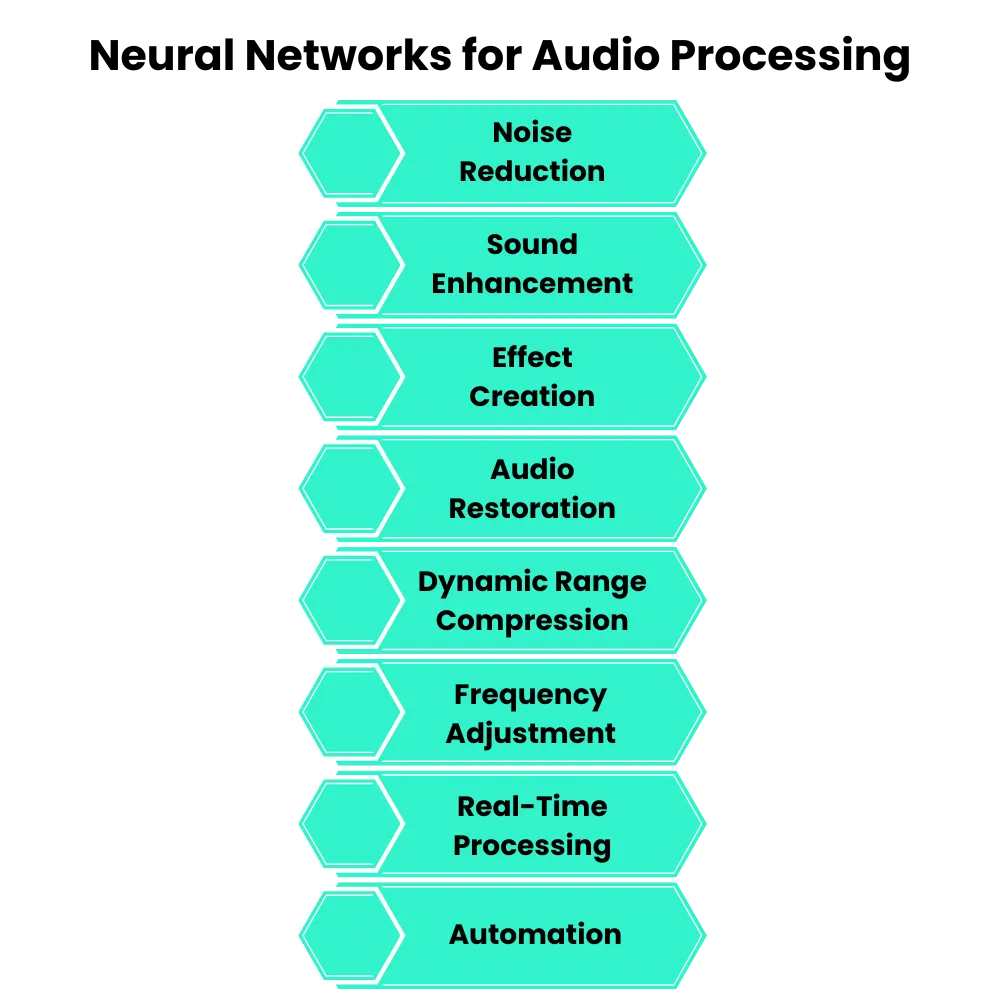
- Noise Reduction: Cleans up audio by removing unwanted sounds.
- Sound Enhancement: Improves the clarity and quality of audio.
- Effect Creation: Generates unique audio effects automatically.
- Audio Restoration: Revives old or damaged recordings.
- Dynamic Range Compression: Balances the volume levels in your tracks.
- Frequency Adjustment: Tweaks specific frequencies for better sound.
- Real-Time Processing: Applies changes instantly during recording.
- Automation: Streamlines the audio editing process.
Reinforcement Learning in Music Creation:
Reinforcement Learning in Music Creation uses AI to learn and improve through trial and error. This method helps AI develop better music creation skills over time.
AI experiments with different chord progressions and learns which ones sound best based on feedback.
Reinforcement learning makes AI more adaptive and intelligent in creating music. It continuously enhances its capabilities to produce better music.
- Adaptive Learning: AI improves its skills over time.
- Enhanced Creativity: Generates more creative and varied music.
- Feedback Integration: Learns from feedback to refine its output.
- Optimal Decision Making: Makes better choices in music creation.
- Personal Growth: Tailors music based on user preferences.
- Efficiency: Speeds up the music creation process.
- Innovation: Pushes the boundaries of traditional music creation.
- User Interaction: Engages users in the learning process.
Music Therapy with AI: Healing Through Sound
Music Therapy with AI uses AI tools to create personalized music for therapeutic purposes. AI can tailor music to help with relaxation, stress relief, and emotional healing.
According to Market.us, the Global AI in Music Market size is expected to be worth around USD 38.7 Billion By 2033, from USD 3.9 Billion in 2023, growing at a CAGR of 25.8% during the forecast period from 2024 to 2033. AI generates calming music to help you relax after a stressful day.
This application of AI supports mental health and well-being. It offers accessible and customizable therapy options through music.
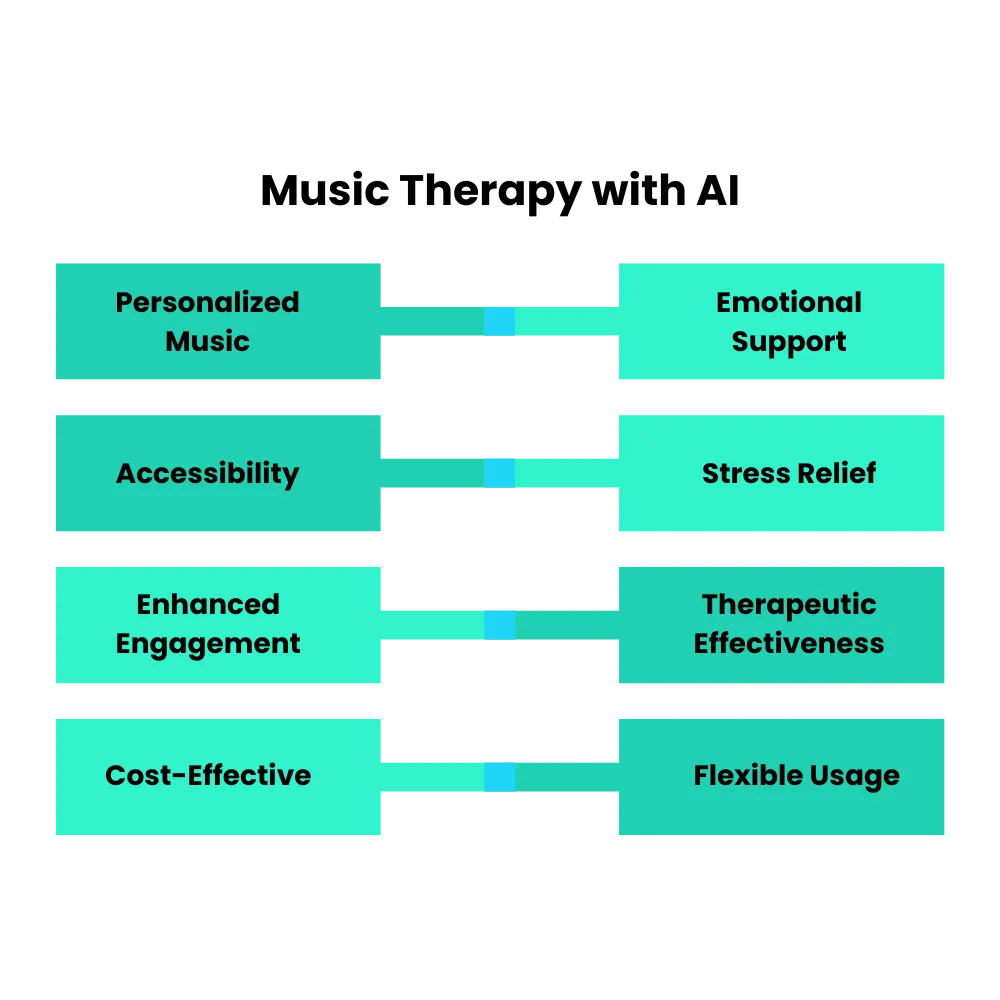
- Personalized Music: Tailors music to individual therapy needs.
- Accessibility: Makes music therapy available to more people.
- Emotional Support: Provides music that helps manage emotions.
- Stress Relief: Creates calming tracks to reduce stress.
- Enhanced Engagement: Keeps users engaged with interactive music.
- Therapeutic Effectiveness: Improves the outcomes of music therapy sessions.
- Cost-Effective: Offers affordable therapy options through AI.
- Flexible Usage: Allows for music therapy anytime, anywhere.
Educational Tools Using AI for Music Learning
Educational Tools Using AI for Music Learning leverage AI to help you learn music more effectively. These tools offer personalized lessons, feedback, and practice routines.
AI listens to your guitar playing and provides instant feedback on your technique.
AI enhances the learning experience by adapting to your skill level and learning pace. It makes music education more interactive and engaging.
- Personalized Lessons: Tailors lessons to your skill level.
- Instant Feedback: Provides real-time corrections and tips.
- Practice Routines: Designs practice schedules based on your goals.
- Interactive Tutorials: Engages you with interactive learning modules.
- Progress Tracking: Monitors your improvement over time.
- Adaptive Learning: Adjusts difficulty based on your performance.
- Resource Recommendations: Suggests materials to aid your learning.
- Gamification: Makes learning fun with game-like elements.
AI in Music Marketing and Promotion:
AI in Music Marketing and Promotion uses AI tools to help you market and promote your music effectively. AI analyzes data through data analytics to target the right audience and optimize your promotional strategies.
AI identifies the best social media platforms to promote your new single based on audience data.
This ensures your music reaches the right listeners. It maximizes your marketing efforts and boosts your music’s visibility.
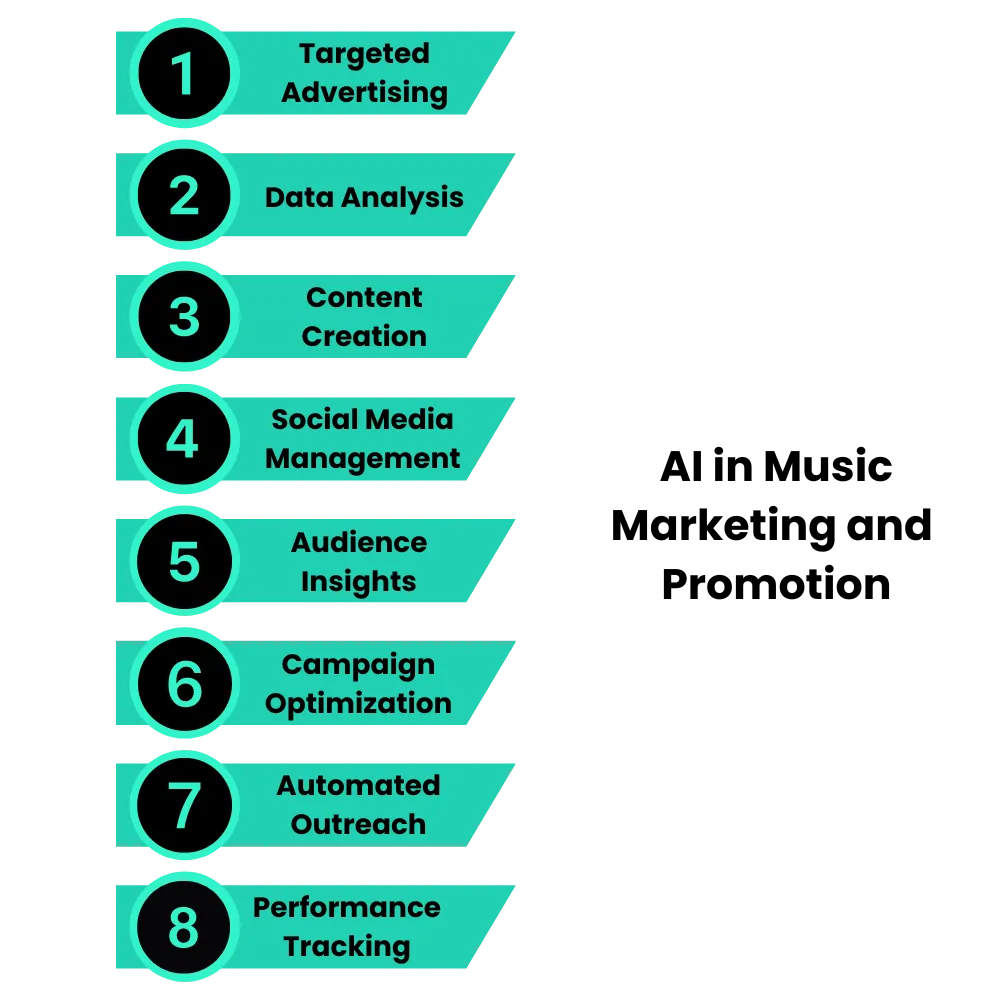
- Targeted Advertising: Reaches the right audience with precision.
- Data Analysis: Analyzes trends to inform marketing strategies.
- Content Creation: Generates engaging promotional content.
- Social Media Management: Optimizes your presence on social platforms.
- Audience Insights: Understands your audience’s preferences.
- Campaign Optimization: Improves the effectiveness of marketing campaigns.
- Automated Outreach: Streamlines communication with fans and promoters.
- Performance Tracking: Monitors the success of your promotional efforts.
The Future of AI-Driven Music: What’s Next?
The Future of AI-Driven Music looks bright and full of possibilities. AI will continue to evolve, bringing new tools and innovations to the music industry.
Future AI might create entire albums based on your favorite artists’ styles, blending them into something new and exciting.
AI will make music creation more accessible and open up new creative avenues. The future holds endless opportunities for musicians and enthusiasts alike.
- Advanced Composition Tools: More sophisticated AI for composing complex music.
- Enhanced Collaboration: AI facilitating global music collaborations.
- Real-Time Music Generation: Instant creation of music during live performances.
- Personalized Music Experiences: Music tailored to individual moods and preferences.
- Virtual Reality Integration: Combining AI with VR for immersive music experiences.
- AI-Driven Music Education: Smarter tools for teaching and learning music.
- Expanded Music Genres: AI creating entirely new genres.
- Sustainable Music Production: Eco-friendly AI tools for music creation.
Innovations in AI Music Technology:
Innovations in AI Music Technology are constantly emerging, pushing the boundaries of what’s possible in music creation and performance.
AI-driven virtual instruments that respond to your movements, allowing for dynamic performances.
These innovations enhance creativity and make music production more efficient. They offer new ways to interact with and create music.
- Virtual AI Musicians: AI that can perform alongside human musicians.
- Interactive AI Music Systems: Systems that respond to user inputs in real-time.
- AI Voice Synthesis for Music: Creating realistic vocal tracks using AI.
- Generative Music Models: AI that generates music without human input.
- Smart Instruments: Instruments enhanced with AI for better playability.
- AI-Powered Music Notation: Automatically transcribes your music into sheet form.
- Emotionally Responsive Music: Music that changes based on your emotions.
- AI-Enhanced Live Performances: AI tools that improve live music shows.
Impact of AI on the Music Industry:
Impact of AI on the Music Industry is profound and far-reaching. AI changes how music is created, produced, marketed, and consumed.
AI helps artists analyze listener data to create more popular songs, boosting their success.
AI democratizes music creation, allowing more people to produce and share music. It also creates new opportunities and challenges for the industry.

- Democratization of Music Creation: More people can create music with AI tools.
- Increased Efficiency: AI speeds up the music production process.
- Enhanced Creativity: AI offers new creative possibilities for artists.
- Data-Driven Decisions: AI helps artists make informed choices based on data.
- New Revenue Streams: AI creates opportunities for monetizing music.
- Market Expansion: AI helps reach global audiences more effectively.
- Job Transformation: AI changes roles within the music industry.
- Ethical Considerations: Raises questions about creativity and ownership.

Conclusion:
OpenAI’s work in advanced NLP tasks is transforming industries and everyday life. From contextual language understanding to AI-powered chatbot development, these innovations make AI smarter, faster, and more adaptable. Whether it’s through fine-tuned AI systems or model optimization techniques, OpenAI continues to push the boundaries of what’s possible with AI.
By focusing on the practical applications of AI and continuously exploring experimental AI features, OpenAI ensures that its systems are always evolving. As AI continues to grow, its impact on our lives will only become more significant.

Author Bio
Read More Blogs
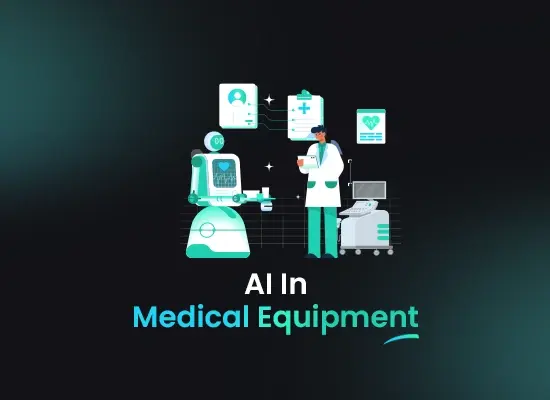
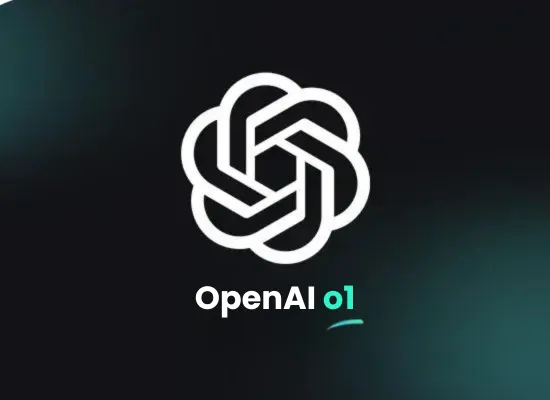
OpenAI o1-preview and o1-mini, The Small Powerhouses of GPT
